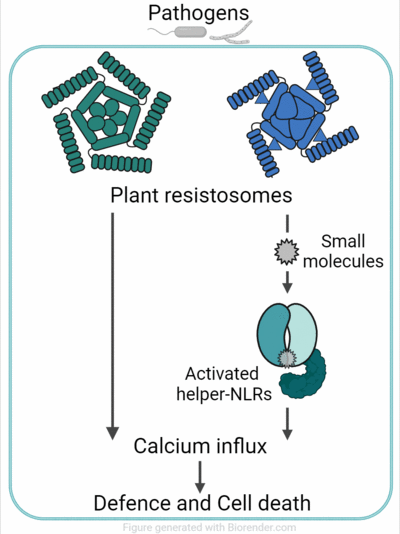Parker, J.E., Hessler, G., Cui, H. (2021) A new biochemistry connecting pathogen detection to induced defense in plants. New Phytologist https://doi.org/10.1111/nph.17924
Pruitt, R.N., Locci, F., Wanke, F., Zhang, L., Saile, S.C., Joe, A., Karelina, D., Hua, C., Fröhlich, K., Wan, W.-L., Hu, M., Rao, S., Stolze, S.C., Harzen, A., Gust, A.A., Harter, K., Joosten, M.H.A.J., Thomma, B.P.H.J., Zhou, J.-M., Dangl, J.L., Weigel, D., Nakagami, H., Oecking, C., El Kasmi, F., Parker, J.E., & Nürnberger, T. (2021) EDS1–PAD4–ADR1 node mediates Arabidopsis pattern-triggered immunity. Nature. https://doi.org/10.1038/s41586-021-03829-0
Bauer, S., Yu, D., Lawson, A.W., Saur, I.M.L., Frantzeskakis, L., Kracher, B., Logemann, E., Chai, J., Maekawa, T., Schulze-Lefert, P. (2021) The leucine-rich repeats in allelic barley MLA immune receptors define specificity towards sequence-unrelated powdery mildew avirulence effectors with a predicted common RNase-like fold. PLoS Pathog 17(2): e1009223. doi:10.1371/journal.ppat.1009223
Mahdi, L.K., Huang, M., Zhang, X., Nakano, R.T., Kopp, L.B., Saur, I.M.L., Jacob, F., Kovacova, V., Lapin, D., Parker, J.E., Murphy, J.M., Hofmann, K., Schulze-Lefert, P., Chai, J., Maekawa, T. (2020) Discovery of a Family of Mixed Lineage Kinase Domain-like Proteins in Plants and Their Role in Innate Immune Signaling. Cell Host & Microbe https://doi.org/10.1016/j.chom.2020.08.012
Sun, X., Lapin, D., Feehan, J.M., Stolze, S.C., Kramer, K., Dongus, J.A., Rzemieniewski, J., Blanvillain-Baufumé, S., Harzen, A., Bautor, J., Derbyshire, P., Menke, F.L.H., Finkemeier, I., Nakagami, H., Jones, J.D.G., & Parker, J.E.(2021) Pathogen effector recognition-dependent association of NRG1 with EDS1 and SAG101 in TNL receptor immunity. Nature Communications 12, Article number: 3335 https://doi.org/10.1038/s41467-021-23614-x
Xing, Y., Xu, N., Bhandari, D.,D., Lapin, D., Sun, X., Luo, X., Wang, Y., Cao, J., Wang, H., Coaker, G., Parker, J.,E., Liu, J. Bacterial effector targeting of a plant iron sensor facilitates iron acquisition and pathogen colonization. The Plant Cell Koab075 https://doi.org/10.1093/plcell/koab075
Zhao, C., Tang, Y., Wang. J., Zeng, Y., Sun, H., Zheng, Z., Su, R., Schneeberger, K., Parker, J.E., Cui, H. (2021) A mis‐regulated cyclic nucleotide‐gated channel mediates cytosolic calcium elevation and activates immunity in Arabidopsis. New Phytologist doi:10.1111/nph.17218
Bauer, S., Yu, D., Lawson, A.W., Saur, I.M.L., Frantzeskakis, L., Kracher, B., Logemann, E., Chai, J., Maekawa, T., Schulze-Lefert, P. (2021) The leucine-rich repeats in allelic barley MLA immune receptors define specificity towards sequence-unrelated powdery mildew avirulence effectors with a predicted common RNase-like fold. PLoS Pathog 17(2): e1009223. doi:10.1371/journal.ppat.1009223


